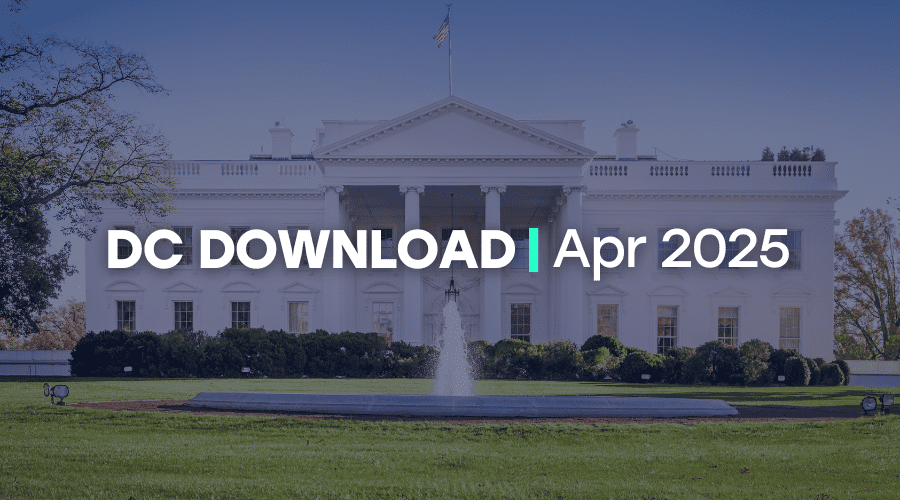Things have heated up on Capitol Hill this month! Seemingly every issue that we work on is seeing significant action, with the possibility that a long-time sector priority could be signed into law at any given moment.
Want to stay up to date, but need the short version? We’ve got you covered. Here are the major federal policy updates from Washington, DC that may impact nonprofit work this month.
Giving USA Underscores the Need for Action
Donations to charity dropped 1.7% in real dollars during 2018, according to the latest annual release of Giving USA. Giving by individuals—which could be most impacted by the changes made to the tax code in 2017—dropped by an alarming 3.4% despite a growing economy. In real dollars (inflation-adjusted dollars), giving to the following portions of the nonprofit sector also declined: religion, education, human services, foundations, health, public-society benefit, and arts, culture and humanities. “Every donation and every donor are critically important to nonprofit organizations’ ability to fulfill their missions,” said Dan Cardinali, president and CEO of Independent Sector, in a recent blog post. “It is time for Congress to recognize this fact by creating a fairer system that helps all Americans, regardless of income, give back to their communities.”
Help us spread this message to legislators and fellow advocates through the #EveryDonationCounts toolkit.
Transportation Fringe Benefits UBIT repeal passes House committee
On June 20, the House Ways and Means Committee advanced the Economic Mobility Act, containing language that would repeal the employee transportation fringe benefits UBIT provision. In advance of the markup, Independent Sector President and CEO Dan Cardinali sent a letter of support for this provision. The letter notes, in part:
“Unlike many for-profit organizations, nonprofits cannot simply pass along these increased costs to the communities they serve. They instead are being forced to curtail their services. It is an outrage to see financial resources on such a grand scale being directed away from charitable missions, but it also is extremely concerning to note what some organizations are being forced to resort to in order to avoid these taxes. Nonprofit organizations already struggle to compete for talented employees with for-profit companies, and a charitable sector that stops offering employee benefits will be at an even greater disadvantage.
Independent Sector was proud to partner with members and allies on research quantifying the resources that these provisions are diverting away from charitable missions nationwide. Please take two minutes to support this effort by asking Congress to choose #MissionNotTaxes.
IRS Reform Legislation Signed by President, 990 E-filing Becomes Law
The Taxpayer First Act (H.R. 3151) cleared the Senate unanimously on June 13 and was signed into law by President Trump on July 1. This legislation reforms IRS processes and procedures, but also contains a few provisions of interest to the charitable sector, such as permanent authorization for the Volunteer Income Tax Assistance (VITA) program and a requirement for all tax-exempt organizations to file their annual information return (Form 990) electronically. Independent Sector has long believed that mandatory electronic filing of Form 990 will improve reporting, research, transparency, and accountability for tax-exempt organizations. This policy victory has been a long time in the making, having been a recommendation of the Panel on the Nonprofit Sector in its 2005 report to Congress.
Budget Negotiators Still Hopeful
While congressional Democrats and the White House continue to express a commitment to lifting the debt ceiling and preventing stricter spending caps from snapping back into place, recent negotiations have not produced an agreement. At press time, the House of Representatives had passed each of its 12 annual spending bills through committee and was on track to clear 10 or 11 of them past the entire chamber by the end of this week. Senate appropriators have indicated an interest in moving ahead shortly but have not yet done so.
Language Rendering the Johnson Amendment Moot Offered in House Committee
This week, the House of Representatives is scheduled to consider its Financial Services and General Government appropriations bill. Because this bill governs funding for the IRS, it is where anti-Johnson Amendment language has appeared in years past. This year, Representative Kevin Hern (R-OK) submitted an amendment to the House Rules Committee that would have prohibited the IRS from enforcing the Johnson Amendment, rendering it moot. This amendment was not made in order by the Rules Committee and will not be considered by the full House of Representatives.
Nonprofit Relief Act introduced
On June 17, Representatives Carolyn Maloney (D-NY) and Jim Clyburn (D-SC) introduced H.R. 3323, the Nonprofit Relief Act. This legislation would repeal the requirement—enacted in 2017—for nonprofit organizations to calculate their unrelated income streams separately for purposes of determining UBIT. It would also extend the paid leave tax credit to nonprofit organizations and adjust the federal volunteer mileage reimbursement rate.



